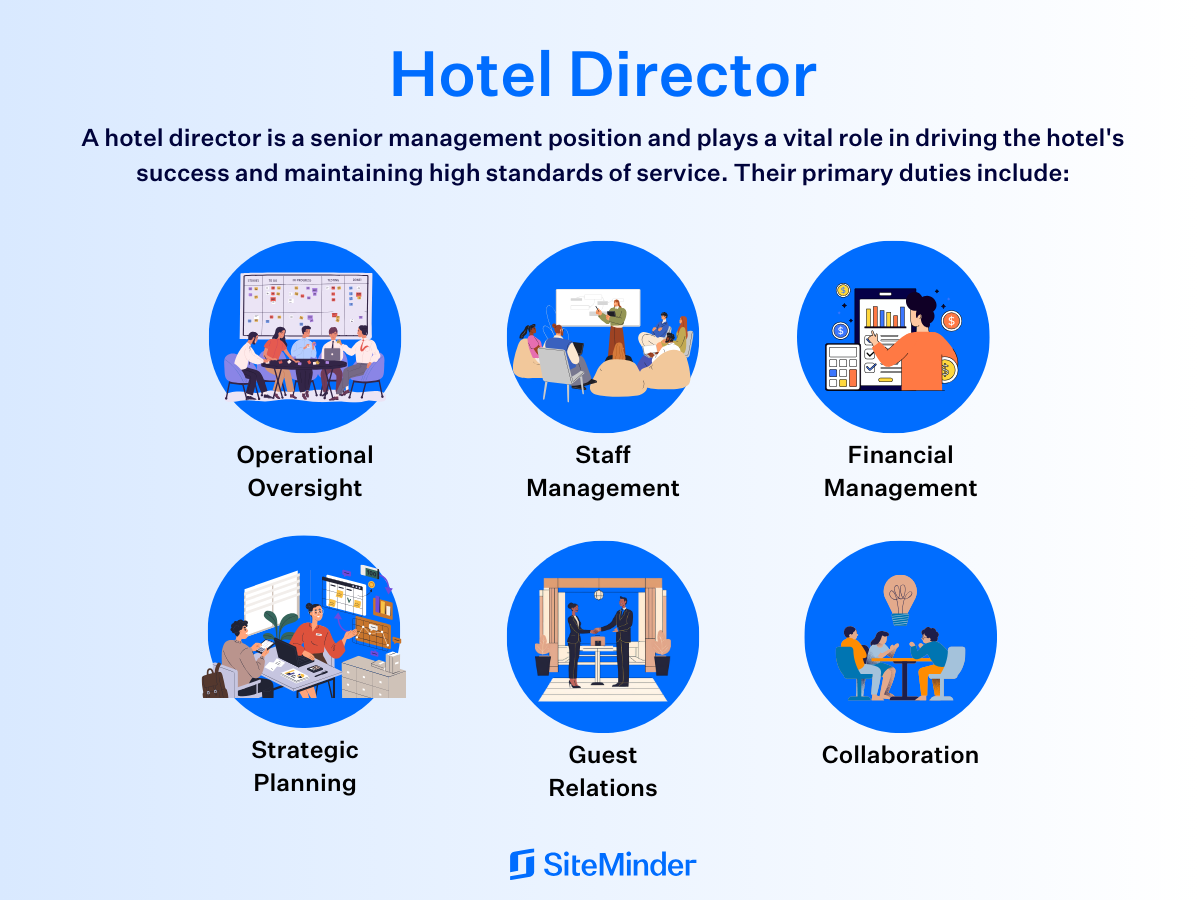What is a hotel director?
A hotel director oversees the daily operations of a hotel, ensuring everything runs efficiently while delivering a high standard of guest service. They’re responsible for key areas such as staff management, guest satisfaction, and financial performance, all while aligning the hotel’s activities with broader business goals.
The title can vary—some properties use terms like hotel manager, lodging manager, or director of hospitality—but the core responsibilities remain the same. The hotel director sets expectations for service, supports team performance, and ensures the property is meeting its revenue and occupancy targets.
Success as a hotel director hinges on a blend of strategic vision, operational expertise, and interpersonal skills. It’s about how effectively you lead, adapt, and drive results. The best directors align daily operations with long-term goals, keeping guests and staff at the centre of every decision.
What is the highest position in a hotel?
The highest position in a hotel typically depends on the size and structure of the property. In most cases, the general manager or hotel director holds the top operational role, overseeing all departments and ensuring the hotel meets its financial and service goals.
In larger hotel groups or chains, there may be regional directors or corporate executives above the hotel level, responsible for multiple properties. These roles focus more on strategic oversight across locations rather than day-to-day operations.
For independent hotels or smaller chains, the hotel director may report directly to the owner or be the owner themselves, especially in owner-operated models.
Ultimately, the top position is the one with the greatest responsibility for the hotel’s overall performance—both in guest satisfaction and profitability.
Is hotel director the same as hotel owner?
Not necessarily. A hotel director is usually an employee responsible for managing the hotel’s operations, while a hotel owner is the individual or entity that holds legal ownership of the property.
In some cases, especially with smaller or independent hotels, the owner may take on the director’s role and be involved in daily operations. However, in medium to large hotels—or those part of a chain—the owner often delegates operational control to a hotel director or general manager. This allows the owner to focus on investment returns while the director ensures the hotel runs efficiently.
The key difference lies in their responsibilities:
- The owner focuses on long-term value and profitability.
- The director focuses on day-to-day performance and guest experience.
In this blog we’ll cover everything you need to know about the role of a hotel director, including the most crucial duties and skills required. Table of contents
Why is hotel director such a crucial role?
A hotel’s success hinges on effective leadership. A capable hotel director ensures smooth operations, consistent guest experiences, and steady revenue growth. Without strong leadership, service standards can slip, staff morale may drop, and profitability can suffer. But with the right person in place, the hotel is better positioned to deliver consistent, high-quality experiences and maintain a competitive edge.
Strong leadership in hospitality directly influences both guest satisfaction and financial performance. Studies show that engaged employees—often the result of supportive management—provide better service, leading to improved guest loyalty and profitability.
Leadership also plays a vital role in staff retention and operational efficiency. Directors who foster a positive workplace culture and encourage innovation not only retain talent but also improve service delivery and adapt more easily to guest needs.
Ultimately, hotel directors are key decision-makers. Their actions shape every part of the guest journey—and the bottom line—by aligning team efforts with strategic goals and responding quickly to challenges on the ground.
Lead your hotel to success with SiteMinder
Run your hotel more efficiently, increase bookings, and make smarter decisions—all from one platform.
Learn more
How to be a successful hotel director
To excel as a hotel director, a strong foundation of experience and education in the hospitality space is essential. Over time, you should look to cultivate a robust skillset encompassing leadership and communication skills, as well as sharp mind for revenue management and general business operations. Above all, you need to understand how important guest satisfaction is and how to achieve it.
It can also be helpful to develop a strategic mindset by constantly analysing global industry trends, technological advancements, and evolving guest preferences.

Director of hospitality: Key responsibilities
Here are key qualities and strategies for success:
Develop a strategic vision
Craft and implement business plans that drive revenue growth and improve guest satisfaction. A clear strategy ensures your hotel stays competitive and appealing to your target market.
Lead and mentor your team
Strong leadership creates a positive workplace culture. Support your department managers, encourage teamwork, and invest in professional development to maintain high service standards.
Ensure financial acumen
Oversee budgeting, forecasting, and financial performance. Understanding your numbers helps you make informed decisions and maintain profitability.
Prioritise guest satisfaction
Delivering exceptional service is essential. Set clear service standards and procedures to ensure every guest leaves satisfied—and ready to return.
Embrace operational oversight
Stay on top of daily operations, from compliance with regulations to maintaining brand standards. A well-run hotel builds trust with both guests and staff.
Adopting tools to be a successful hotel director
The right technology helps hotel directors work smarter, streamlining tasks, improving guest experiences, and boosting your bottom line.
At the core of efficient operations is a property management system (PMS), which centralises everything from bookings to housekeeping schedules. This simplifies daily workflows and frees up your team to focus on delivering great service.
To maximise bookings and stay in control of your inventory, channel management tools ensure your room availability and rates are always up to date across every sales channel—avoiding double bookings and missed revenue.
Revenue management software takes the guesswork out of pricing by automatically adjusting your rates based on demand, seasons, and competitor activity. This helps you maximise occupancy while driving higher revenue per room.
Guest engagement platforms improve the experience for every guest, offering personalised communication before, during, and after their stay. These tools help you respond faster to feedback and build lasting relationships.
Finally, data analytics tools give you real-time insights into your hotel’s performance, helping you make informed decisions quickly. Whether it’s tracking occupancy rates or understanding booking trends, you’ll have the information you need at your fingertips.

